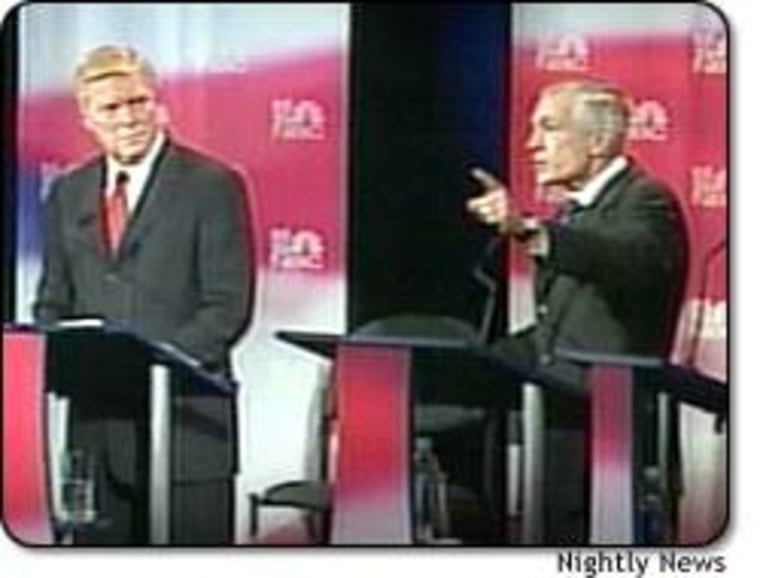One of Democratic presidential contender Howard Dean’s chief points of vulnerability is his previous call for curbing Medicare’s growth rate. His rivals Sen. John Kerry and Rep. Dick Gephardt have their own vulnerability: their votes for last year’s resolution authorizing President Bush to go to war against Iraq. In Monday’s MSNBC debate, these vulnerabilities were all the more apparent. What was different about Monday’s event is how vigorously Kerry went on the offensive in attacking Dean on Medicare, using the very same arguments Gephardt had made just a day earlier.
The debate was broadcast live across Iowa, which holds its first-in-the-nation precinct caucuses on Jan. 19.
Dean is the front-runner in money, momentum and most polls, so it was natural that he became the target for most of his rivals’ criticism.
“I most certainly appreciate all this attention I’m getting,” he cracked at one point.
The debate’s high point came when Kerry no fewer than six times pressed Dean to answer the question of whether as president he would seek to reduce the rate of growth of Medicare.
Dean deftly avoided giving a direct answer, at one point changing the topic by saying, “What I intend to do in Medicare is to increase reimbursements for states like Iowa and Vermont....”
Kerry refused to let go, saying, “You still haven’t answered the question.”
Reporters had no better luck in the post-debate spin room. When one reporter asked Dean again whether he’d reduce Medicare’s growth rate, Dean replied, “I said Medicare was off the table, cuts in Medicare are off the table.”
How about the rate of growth? the reporter persisted.
“Cuts in Medicare are off the table,” Dean repeated.
As in previous debates, Dean also found himself attacked from the left by Rep. Dennis Kucinich of Ohio.
When Dean said trade accords with other nations had to include labor rights and environmental protections, Kucinich acerbically said, “The fact is, governor — and you know this full well — that unless you cancel NAFTA and the WTO, you can never get into that discussion.... You’ll never be able to address the loss of underlying jobs.”
But Dean knows his principal targets need to be Kerry and Gephardt, not Kucinich, so he gave back as good as he got to those two contenders. Dean went after Kerry in particular for his vote on the Iraq war.
When Kerry touted his experience in dealing with foreign affairs, Dean shot back, “His experience led him to give the president of the United States a blank check to invade Iraq.... That was an abdication and a failure on the part of Congress. And Sen. Kerry was part of that failure.”
If Kerry was one the debate’s winners with his dogged attacks on Dean, then retired Gen. Wesley Clark was another.
Clark seemed to bring more passion to the MSNBC event than he had to previous joint appearances — or perhaps the political novice is simply becoming more comfortable with the thrust-and-parry of televised politics.
He delivered an indignant attack on Bush, who, he charged, “misled the American people and Congress into war.... If you wrote this script in a movie, it would be rejected as being outrageous.”
Clark has made a strategic decision — which may prove very costly — to not actively compete here in Iowa. Thus he will cede much of the media spotlight from now until Jan. 19 to Dean, Kerry and the others who are vying here.
An award for political courage might go to Sen. John Edwards, D-N.C. Asked about his vote for the USA Patriot Act — a law almost universally despised by rank-and-file Democrats — Edwards gamely said, “There are provisions in the Patriot Act which never get any attention which do good things,” for example, measures on money-laundering and requiring more information-sharing among government agencies.
But then edging back to politically safer ground, Edwards lashed out at a favorite Democratic target, Attorney General John Ashcroft, whom Edwards accused of misusing the law. “We cannot give John Ashcroft this kind of authority,” he said.
